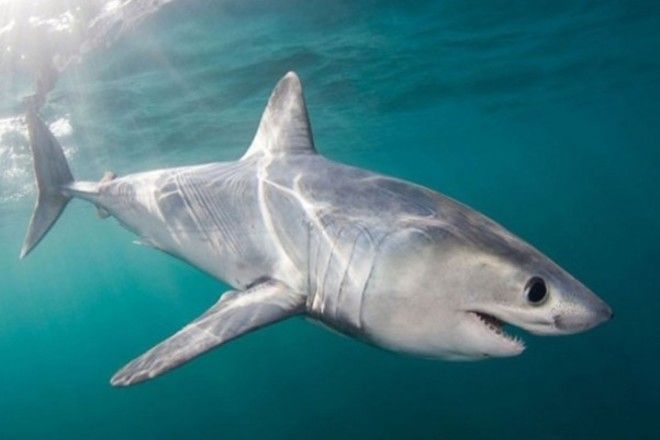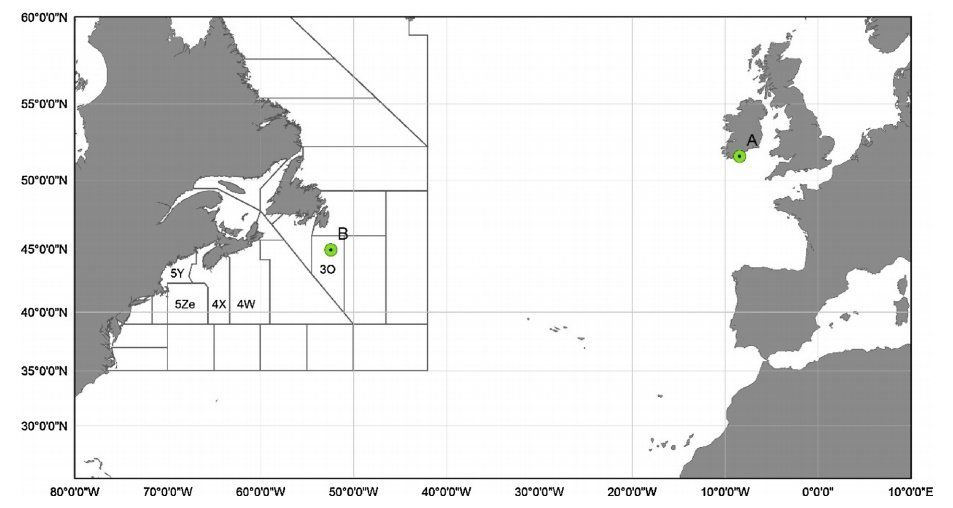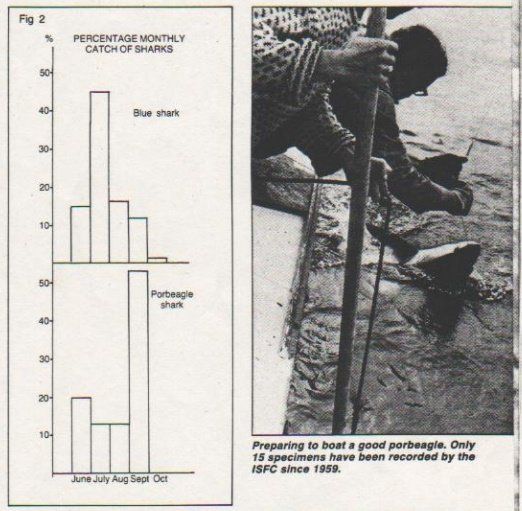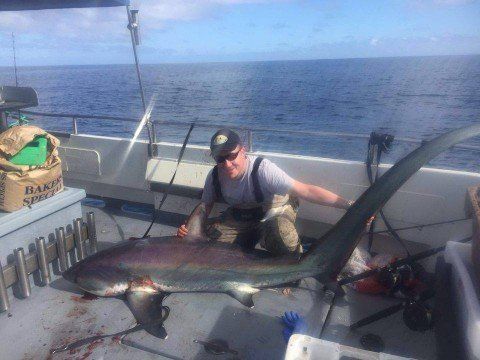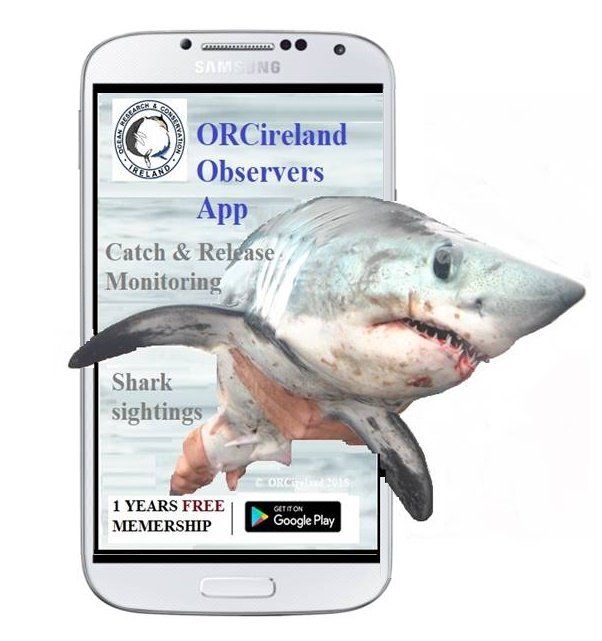Transatlantic journey for porbeagle shark tagged off the south coast of Ireland.
Work carried out under IFI's National Marine Sportfish Tagging Programme, has provided the first evidence that porbeagle sharks undergo transatlantic journeys.
A new study published in Fisheries Research has presented the first record of a porbeagle shark's transatlantic movement from Irish waters to where the tag was recovered, 10 years later, by a Faroes vessel in Canadian waters, a minimum of 3300 km away (straight line displacement).
The 9kg female porbeagle shark was first caught rod and line by a recreational angler, and tagged by the charter boat skipper off the coast of Kinsale, Co. Cork on the 5th of August 1972 as part of the Inland Fisheries Ireland- Marine Sport Fish Tagging Programme. The shark was recaptured after 3742 days, on the 3rd of November 1982 by a Faroes commercial long-liner, south of the Grand Banks of Newfoundland. At capture the shark was reported to be 185 cm and 100 kg although described as "in poor condition". At the time of re-capture, the porbeagle was still below the size of sexual maturity so it has been suggested that the transatlantic journey was driven by prey availability rather than reproductive status. Pade et al., (2009), hypothesised that porbeagle shark can undergo transatlantic movements to exploit patches of prey, similar to the behaviour reported for Atlantic bluefin tuna ( Thunnus thynnus) .
Previous research reported porbeagle sharks travelling from the Bay of Biscay to the mid-Atlantic ridge over a period of 4 to six months, however the sharks then returned to the Bay of Biscay or Irish continental shelf soon after (Biais et al., 2017). Over the past few decades the numbers of porbeagle sharks caught have been greatly reduced, largely due to overfishing, bycatch and illegal fishing for shark fins. Yet Ireland has a long history with angling for blue ( Prionace glauca) and porbeagle sharks. In 1959, the monthly frequency of specimen captures of porbeagle shark were reported for September. The porbeagle in contrast to the blue was found to come close to inshore waters during the early summer, and porbeagles had been recorded off the west coast of Ireland as late as Christmas.Porbeagles were historically commercially fished off the west coast of Ireland by Norwegian long-liners during the summer.
These new findings that porbeagles cross the Atlantic ocean on their seasonal migrations, although of a small sample size with one individual, brings into question the movements of other temperate Lamnidae spp. such as white sharks ( Carcharodoncarcharias)
with movement from the U.S. coastline as far as the Azores recorded from satellite tagging studies in the North Atlantic (Skomel et al
., 2017).
Other species such as shortfin mako's ( Isurusoxyrinchus)
have also been shown to have a wide range across the North Atlantic (Campana, 2015). In 2016, an estimated 300lb thresher shark ( Alopias vulpes)
was caught and released by Angler John Harrington, out of Kinsale off the south coast of Ireland (Quigley et al
., 2018).
Anglers play an important role as ambassadors of shark conservation and can contribute to research directly by becoming a citizen science and submitting records of sharks caught and released through the "ORCireland Observers"" App available to download from the Home page on our website www.orcireland.ie. Read more here: https://www.orcireland.ie/angling-for-conservation.
Data from citizen science records will contribute directly to Inland Fisheries Ireland long term tagging programme which has been running since the 1970's. Records of recaptures of tagged sharks should be submitted directly to Inland Fisheries Ireland on their website following this link: https://www.fisheriesireland.ie/Tagging/marine-sport-fish-tagging-programme.html#about-the-marine-sport-fish-tagging-programme.
© Ocean Research & Conservation Ireland (ORCireland) and www.orcireland.ie , est. 2017. Unauthorized use and/or duplication of this material without express and written permission from this site’s author and/or owner is strictly prohibited. Excerpts and links may be used, provided that full and clear credit is given to Ocean Research & Conservation Ireland and www.orcireland.ie with appropriate and specific direction to the original content.
References:
Biais, G., Coupeau, Y., Séret, B., Calmettes, B., Lopez, B., Hetherington, S., Righton, D., Durif, C., (2017). Return migration patterns of porbeagle shark ( Lamna nasus
) in the Northeast Atlantic: implications for stock range and structure, ICES Journal of Marine Science
, 74, 1268–1276, https://doi.org/10.1093/icesjms/fsw233.
Cameron, L.W.J., Roche, W. , Greene, P., Haughton, J.D.R., Mensink, P.J., (2018). Transatlantic movement in porbeagle sharks, Lamna nasus.
Fisheries Research,
207, 25-27. https://doi.org/10.1016/j.fishres.2018.05.014
.
Campana, S.E., Joyce, W., Fowler, M., Showell, M., (2016). Discards, hooking, and post-release mortality of porbeagle ( Lamna nasus
), shortfin mako ( Isurus oxyrinchus
), and blue shark ( Prionace glauca
) in the Canadian pelagic longline fishery , ICES Journal of Marine Science
, 73, Issue 2, 520–528, https://doi.org/10.1093/icesjms/fsv234.
Quigley, D.T.G., Hannon, G., Roche, W.K., (2018). Thresher Shark ( Alopias
vulpinus (Bonnaterre)) captured off Kinsale, C. Cork – possibly a new Irish rod and line record. Irish Naturalists Journal
36(1):59-61.
G. B. Skomal, G.B., Braun, C.D., Chisholm, J.H.,, Thorrold, S.R., (2017). Movements of the white shark Carcharodon carcharias in the North Atlantic Ocean. Inter - Research , Marine Ecology Progress Series , 580, 1-16.
SHARE THIS ARTICLE







